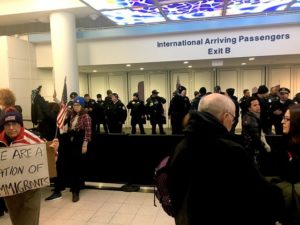
The Los Angeles Times is reporting the nation’s highest court has revived President Trump’s Muslim travel ban.
The Washington Post is reporting the court is allowing a limited version of the ban to go through, and will rule on the full version in the fall.
The Post reported the administration will be allowed to implement a 90-day ban on travelers from Libya, Iran, Somalia, Sudan, Syria and Yemen and a 120-day ban on all refugees entering the United States, with some exceptions.
According to The Hill, the court said the Administration could block entry to any person who does not have a relationship with anyone in the United States.
People who can show a relationship to anyone in the country will be allowed in.
Several lower courts have blocked the ban, but the Supreme Court says the constitution gives the President broad powers to ban or suspend the entry of foreign individuals or groups into the country.
“Obviously were disappointed even parts of the Muslim ban was allowed to go forward,” Ibrahim Hooper of the Council on American-Islamic Relations said to AsAmNews this morning. “We’ll be studying this further to see what the best response is from a legal perspective.”
“The President’s executive orders are clearly discriminatory on their face, painting millions of people with suspicion and making our communities question their place in this nation of immigrants, said the Executive Director of South Asian Americans Leading Together, Suman Raghunathan, to AsAmNews. “Reinstating any portion of the Muslim ban is contrary to the values of the United States. The President’s executive orders and the Supreme Court’s decision to reinstate part of these bans does not make America safe, it makes America afraid.”
“We are deeply disappointed that the U.S. Supreme Court is allowing any part of the Muslim travel ban to move forward.” President and Executive director John C Yang of Asian Americans Advancing Justice, AAJC, also said to AsAmNews.
Federal courts in Hawaii, Washington State and Maryland had blocked the ban on travel from six predominantly Muslim countries. Several Asian Americans were involved in those decisions.
Judge Theodore Chuang of Maryland blocked the ban in March, the second to do so. Watson said the new order was “issued with a purpose to disfavor a particular religion, in spite of its stated, religiously neutral purpose.”
The ban was also successfully challenged by Hawaii Attorney General Doug Chin.
“I know this executive order, it’s not internment camps,” said Chin, “but it’s a dog whistle. It’s a bad shadowing of things to come. I couldn’t live with myself if we went down a path and didn’t speak up.”
Judge Derrick Watson of Hawaii ruled in favor of Chin in blocking the order.
The original ban was blocked by the federal courts. President Trump then issued a second version of his ban which the federal courts ruled was very similar to the first. That order was also blocked.
AsAmNews has Asian America in its heart. We’re an all-volunteer effort of dedicated staff and interns. You can show your support by liking our Facebook page at www.facebook.com/asamnews, following us on Twitter, sharing our stories, interning or joining our staff.



